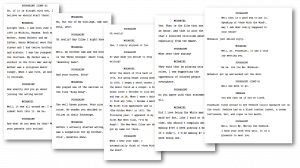“Inviting Genius”: Students as Producers in African American Studies
by Nancy Chick, CFT Assistant Director
The CFT’s theme this year, “Students as Producers,” has given me the opportunity to talk with some talented and thoughtful colleagues across campus. On October 24, I brought together three of them to have a conversation on teaching about “Producing, Performing, & Creating Learning across the Humanities: Models of Generative Learning Assignments.” Their ideas were so rich that I’m devoting separate blog posts to each of them. Today: Alice Randall.
Alice Randall (English Department, African American Diaspora Studies) began the conversation with her challenge to students: “I want my students to create and not just consume knowledge, so I tell them, ‘To get an A, you have to teach me something.'” Her students work hard to rise to the challenge, and she supports their efforts by carefully scaffolding their learning in a four-stage process. Her courses–whether African-American Children’s Literature, or Country Lyrics in American Literature, or The History of African-American Film–always begin with the theory, followed by the relevant histories, giving students a grounding for the harder theoretical work. Next, the students analyze the texts through the lenses of these theories and histories. Finally, students create or produce “something new.”
What do they create?
- In the African American children’s literature course, a group of students made a children’s book that integrated some of the themes and motifs from the books they’d analyzed, responded to cultural stereotypes, and supported the development of its potential readers.
 In the African American film course, a student wrote a script about actress Hattie McDaniel, the first African American to win an Academy Award. The script was “steeped in” course context and content, and in research from the student’s independent work, creatively adapted to the story of the woman whose life went well beyond her role as Mammy in Gone with the Wind. (See excerpt to the right.)
In the African American film course, a student wrote a script about actress Hattie McDaniel, the first African American to win an Academy Award. The script was “steeped in” course context and content, and in research from the student’s independent work, creatively adapted to the story of the woman whose life went well beyond her role as Mammy in Gone with the Wind. (See excerpt to the right.) - Another student in the film course shifted away from what began as a script for a traditional biopic of an African American athlete and instead created a 7-minute film that invokes and defies expectations about black athletes.
Students share these projects in class and then reflect on their process, their work, and their learning. As in Rory’s class, this metacognitive work is critical in making the students’ learning lasting and meaningful. Alice adds, “I don’t want my grading to be the final word on their work.”
Alice notes that Vanderbilt students are well equipped for the “arduous mastery of identifying a project and exhaustively completing it,” so she asks them for a bit more. She asks them to stretch beyond what what they already know and “invites genius”: “If you give them the space, you give them the chance to figure out what they are really good at.”
—
For additional ideas on alternative projects for students in the humanities, check out the CFT guide “Beyond the Essay: Making Student Thinking Visible in the Humanities.”
The previous posts featured 1) Rory Dicker’s Women and Gender Studies Program’s students’ activism projects and 2) Nathalie Dieu-Porter’s French students’ online testimonies.

Leave a Response